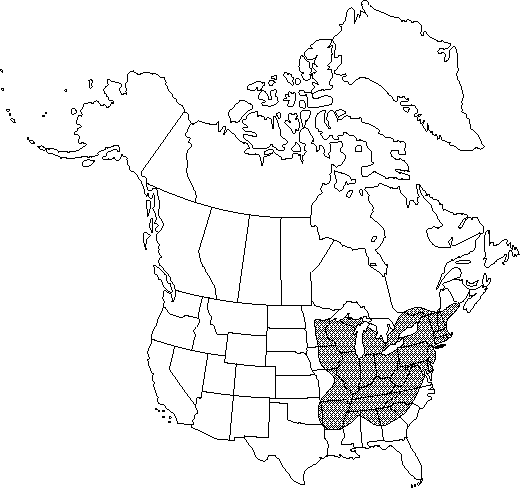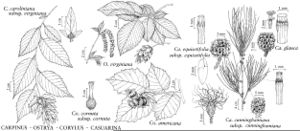Difference between revisions of "Carpinus caroliniana subsp. virginiana"
Syst. Bot. 12: 429. 1987.
FNA>Volume Importer |
FNA>Volume Importer |
||
| Line 13: | Line 13: | ||
}}{{Treatment/ID/Special_status | }}{{Treatment/ID/Special_status | ||
|code=F | |code=F | ||
| − | |label= | + | |label=Illustrated |
}} | }} | ||
|basionyms={{Treatment/ID/Basionym | |basionyms={{Treatment/ID/Basionym | ||
|name=Carpinus betulus var. virginiana | |name=Carpinus betulus var. virginiana | ||
|authority=Marshall | |authority=Marshall | ||
| + | |rank=variety | ||
|publication_title=Arbust. Amer., | |publication_title=Arbust. Amer., | ||
|publication_place=25. 1785 | |publication_place=25. 1785 | ||
}} {{Treatment/ID/Basionym | }} {{Treatment/ID/Basionym | ||
|name=Carpinus virginiana | |name=Carpinus virginiana | ||
| − | |authority= | + | |authority= |
| + | |rank=species | ||
|publication_title= | |publication_title= | ||
|publication_place=1893 | |publication_place=1893 | ||
| Line 29: | Line 31: | ||
|name=Carpinus caroliniana var. virginiana | |name=Carpinus caroliniana var. virginiana | ||
|authority=(Marshall) Fernald | |authority=(Marshall) Fernald | ||
| + | |rank=variety | ||
}} | }} | ||
|hierarchy=Betulaceae;Betulaceae subfam. Coryloideae;Carpinus;Carpinus caroliniana;Carpinus caroliniana subsp. virginiana | |hierarchy=Betulaceae;Betulaceae subfam. Coryloideae;Carpinus;Carpinus caroliniana;Carpinus caroliniana subsp. virginiana | ||
| Line 44: | Line 47: | ||
|elevation=0–300 m | |elevation=0–300 m | ||
|distribution=Ont.;Que.;Ala.;Ark.;Conn.;Del.;D.C.;Ga.;Ill.;Ind.;Iowa;Ky.;Maine;Md.;Mass.;Mich.;Minn.;Miss.;Mo.;N.H.;N.J.;N.Y.;N.C.;Ohio;Okla.;Pa.;R.I.;S.C.;Tenn.;Vt.;Va.;W.Va.;Wis. | |distribution=Ont.;Que.;Ala.;Ark.;Conn.;Del.;D.C.;Ga.;Ill.;Ind.;Iowa;Ky.;Maine;Md.;Mass.;Mich.;Minn.;Miss.;Mo.;N.H.;N.J.;N.Y.;N.C.;Ohio;Okla.;Pa.;R.I.;S.C.;Tenn.;Vt.;Va.;W.Va.;Wis. | ||
| − | |discussion=<p><i>Carpinus caroliniana </i>subsp.<i> virginiana</i> is the familiar hornbeam of the Appalachians and interior forested northeastern North America. The leaves are distinctive in that they bear scattered dark glands on the abaxial surface. This subspecies hybridizes and intergrades with < | + | |discussion=<p><i>Carpinus caroliniana </i>subsp.<i> virginiana</i> is the familiar hornbeam of the Appalachians and interior forested northeastern North America. The leaves are distinctive in that they bear scattered dark glands on the abaxial surface. This subspecies hybridizes and intergrades with <i></i>subsp.<i> caroliniana</i> where their ranges overlap in a broad band running from the Carolinas south to northern Georgia and westward to Missouri, Arkansas, and southeastern Oklahoma (J. J. Furlow 1987).</p> |
|tables= | |tables= | ||
|references= | |references= | ||
| Line 53: | Line 56: | ||
-->{{#Taxon: | -->{{#Taxon: | ||
name=Carpinus caroliniana subsp. virginiana | name=Carpinus caroliniana subsp. virginiana | ||
| − | |||
|authority=(Marshall) Furlow | |authority=(Marshall) Furlow | ||
|rank=subspecies | |rank=subspecies | ||
| Line 67: | Line 69: | ||
|publication title=Syst. Bot. | |publication title=Syst. Bot. | ||
|publication year=1987 | |publication year=1987 | ||
| − | |special status=Endemic; | + | |special status=Endemic;Illustrated |
| − | |source xml=https://jpend@bitbucket.org/aafc-mbb/fna-data-curation.git/src/ | + | |source xml=https://jpend@bitbucket.org/aafc-mbb/fna-data-curation.git/src/f50eec43f223ca0e34566be0b046453a0960e173/coarse_grained_fna_xml/V3/V3_707.xml |
|subfamily=Betulaceae subfam. Coryloideae | |subfamily=Betulaceae subfam. Coryloideae | ||
|genus=Carpinus | |genus=Carpinus | ||
Revision as of 21:30, 16 December 2019
Trees, to 12 m; trunks short, crooked, shallowly to deeply and often irregularly fluted, crowns broadly spreading. Bark bluish gray, smooth to somewhat roughened. Leaf blade ovate or elliptic to narrowly elliptic, (6–)8–12 × 3.5–6 cm, base narrowly rounded to cordate, margins coarsely and unevenly doubly serrate, teeth sharp and slender, secondary teeth almost as large as primary teeth, apex usually abruptly nearly caudate, but sometimes long, gradually tapered; surfaces abaxially usually moderately pubescent, especially on major veins, covered with numerous tiny, dark brown glands. Inflorescences: staminate inflorescences 2–6 cm; pistillate inflorescences 1–3 cm. Infructescences 4.5–12 cm; bracts 2.5–3.5 × 1.5–2.8 cm, lobes narrowly triangular, sharp-tipped. 2n = 16.
Phenology: Flowering late spring.
Habitat: In understory stratum in rich deciduous forest along stream banks, on flood plains, and on moist hillsides
Elevation: 0–300 m
Distribution

Ont., Que., Ala., Ark., Conn., Del., D.C., Ga., Ill., Ind., Iowa, Ky., Maine, Md., Mass., Mich., Minn., Miss., Mo., N.H., N.J., N.Y., N.C., Ohio, Okla., Pa., R.I., S.C., Tenn., Vt., Va., W.Va., Wis.
Discussion
Carpinus caroliniana subsp. virginiana is the familiar hornbeam of the Appalachians and interior forested northeastern North America. The leaves are distinctive in that they bear scattered dark glands on the abaxial surface. This subspecies hybridizes and intergrades with subsp. caroliniana where their ranges overlap in a broad band running from the Carolinas south to northern Georgia and westward to Missouri, Arkansas, and southeastern Oklahoma (J. J. Furlow 1987).
Selected References
None.
